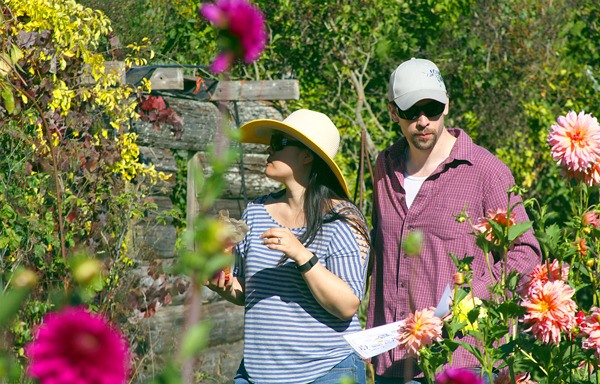Even after a long day of showcasing her small farm, Valerie Reuther’s spirits were as bright as the colorful dahlias that illuminated a nearby flower garden.
About 350 people passed through Rosehip Farm in Coupeville Saturday. The farm was one of 11 sites featured on the 2015 Whidbey Island Farm Tour that celebrated its 10th year over the weekend.
“It helps with our mission,” said Reuther, who owns Rosehip along with her partner Linda Bartlett. “Our mission is to help people connect to where their food comes from.”
“And it’s fun for us because we get to show off a little.”
The Farm Tour, started in 2005 by a group of volunteers working with the Whidbey Conservation District, experienced strong first-day attendance followed by the usual dropoff for those who participated on Sunday.
Visitors got to see what each venue produces and witness how farms operate during one of the busiest times of season.
The tour also provided additional education with instruction and demonstrations as well as an historic barn tour.

“They asked good questions,” said Adam Kendrick, the farm manager at Willowood Farm on Ebey’s Prairie who offered a talk on fall and winter farm production.
More than 300 people walked through Willowood Farm Saturday, with roughly half that number on Sunday.
Those numbers were comparable to the ones reported at Wildwood Farm in Oak Harbor.
Gregg Lanza, co-owner of Wildwood along with Heather Carder, spent part of the weekend at the wheel of a tractor, giving visitors a tour of their 80-acre farm and horse stable that caters to equestrian lifestyle.
“Every time we put this on, we get a lot of people who say, ‘I didn’t even know that you were here,’” Lanza said.
It’s that sort of exposure that is beneficial for all parties.
Among the goals of the Farm Tour is to show the public the good stewardship practices employed at local farms and to promote the benefits of locally produced foods.
“This is great for us,” Reuther said. “It’s really good visibility for the farm. We get new customers. Sometimes, the new customers join the CSA (Community Supported Agriculture).”
“It gives us the ability to show off a little bit,” Lanza said.
“The other thing I try to do is to help people understand a little about what goes on at a facility like this or any kind of farm — the kind of expense and time it takes to run a place like this.”


